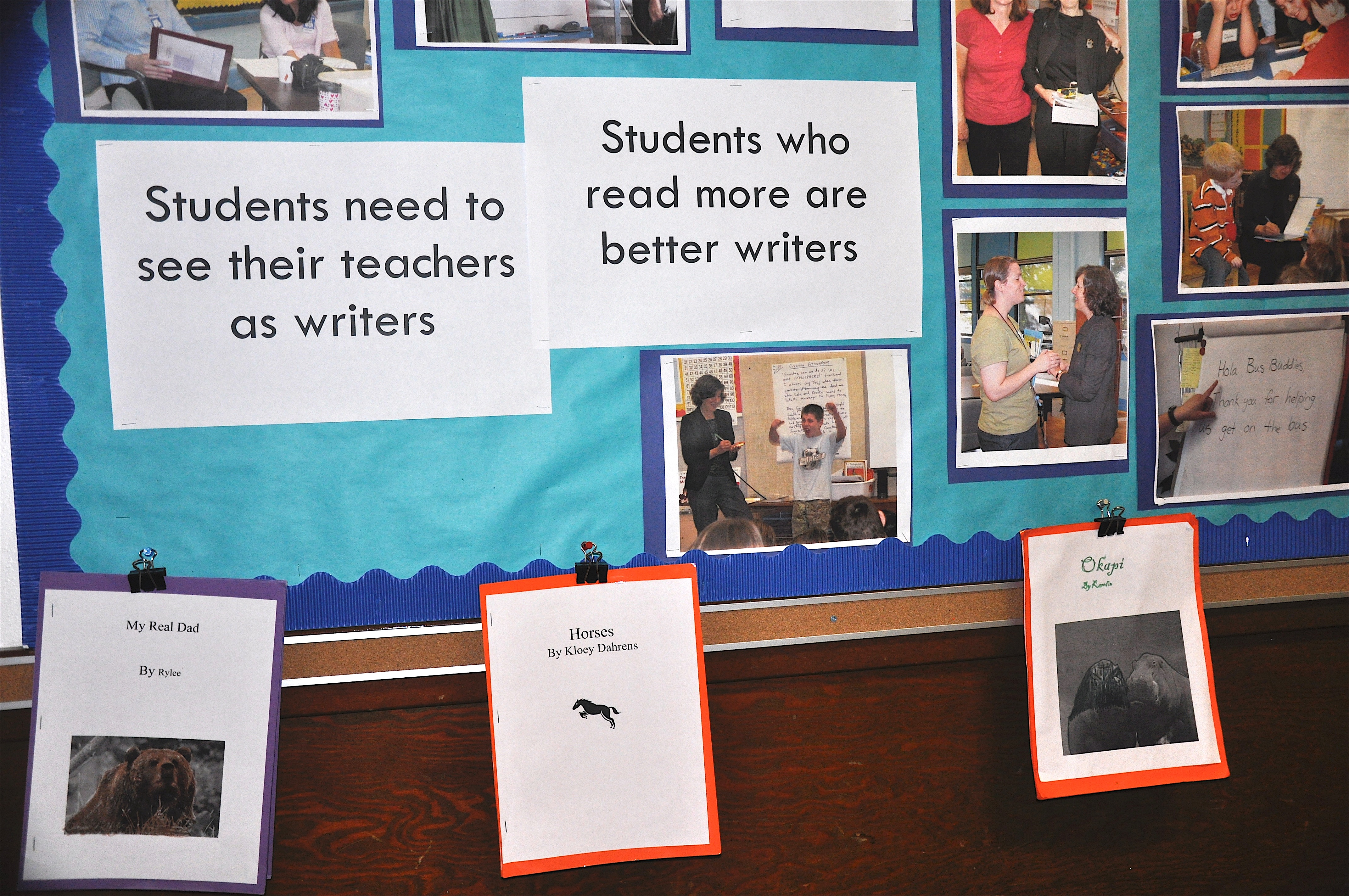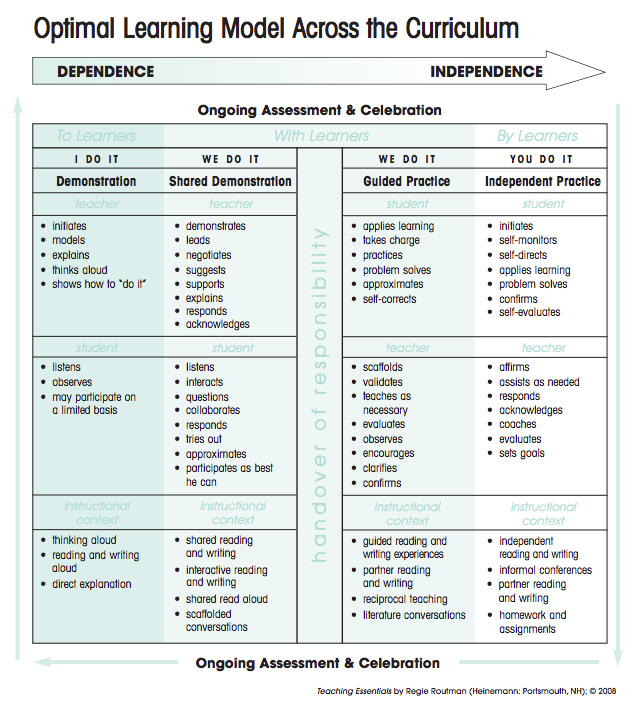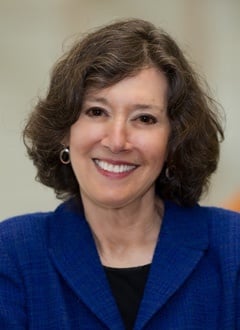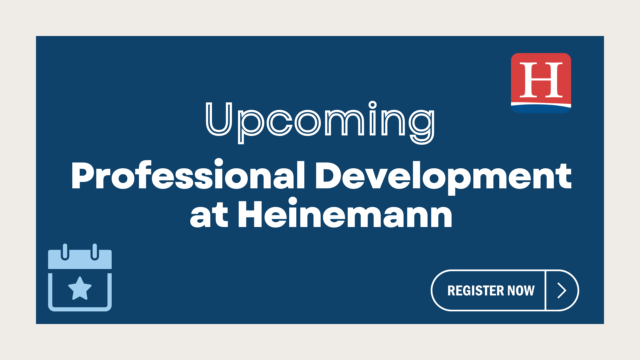
by Regie Routman
I’ve been teaching and learning how to be a more effective teacher for most of my adult life.
One thing I know for sure.
Of all the factors that predict how well K-12 students do in learning to critically read, write and think, ongoing professional learning is the most vital. In fact, student learning and teacher expertise are inseparable.
To be clear, professional learning and professional development are not the same. Too often “development” is associated with and even called “training.” That is, an expert or program is secured to deliver top-down information—frequently without teacher input and prompted by lagging test scores—and teachers are expected to learn how to do a one-size-fits-all implementation, often “with fidelity." Such professional development, especially if it is disconnected from students’ actual literacy needs and interests, can be a time waster.
By professional learning, we are part of a PLC, what I call a professional LITERACY community, meeting regularly as a whole school and in small teams to develop “collaborative expertise” with the goal of improving engagement, excellence, and equity for all students. I developed the video-based Transforming Our Teaching Series when I realized that until teachers could “see” the moves of expert teachers and “hear” the thinking and language of effective teaching and feedback followed by analysis as well as application to and with their own students, nothing much of significance would change for improving student learning.
Regardless of whether we are new to teaching or highly experienced, what follows are ten professional learning goals and actions that can enrich and improve student learning and teaching across a whole school. The hard truth is that a few expert teachers at a school are insufficient; it takes a whole school of knowledgeable, skillful teachers, working productively and collaboratively with a knowledgeable, caring principal and peers each and every day to make lasting, worthwhile, equitable change for all. (All of the essentials are demonstrated in diverse classrooms in the Transforming Our Teaching Series.)
- Prioritize professional learning. Our time is limited, and most of us are too busy to add anything “new” to our teaching lives. And yet! High-level professional learning, especially when it is embedded into a trusting culture, increases student learning. So it’s our obligation to insist our school implement such learning in an ongoing, collaborative manner. We spend time on what we value; prioritize the greatest learning need(s) for improving student learning at your school. Then stay focused on that literacy initiative for example, teaching readers for at least three years. I developed the Transforming our Teaching Series to make ALL of that possible and doable.
- Make time for professional reading. The most highly effective teachers I know read articles, research, blogs, books, etc. to continuously improve and enhance their knowledge and instructional practices. It’s a necessity! Skip the complicated projects; avoid time consuming “learning centers”; let go of the worksheets; leave school at a reasonable hour; make professional reading high priority even when we are new to the profession. The payoff is huge; we are more apt to ask more vital questions, become more reflective and thoughtful as educators, and feel more competent and confident as teachers and learners.
- Develop shared beliefs and common language. A shared school vision is essential but not enough. It’s no exaggeration to say that until a whole school comes together discussing and agreeing upon literacy beliefs supported by research and principled practices, there will be no lasting achievement.
 One school's first attempt at developing shared beliefs—and making them public.
One school's first attempt at developing shared beliefs—and making them public. - Work toward a culture of collaborative expertise. In high-performing schools, the principal and a group of teachers-as-leaders work together to determine, plan, and co-lead the ongoing professional learning. Those PLC's include, but are not limited to, starting with a celebration—read-aloud, student work sample, teacher story—discussion of professional reading, conversation around trying out learning from the previous PLC, viewing and analyzing video of expert teaching, and so on.
- Create an intellectual culture. Ensure the questions we ask are important, high-level ones that encourage deep thought. Teach more reading and writing in the content areas, such as social studies and science, and connect big ideas with a real-world audience and purpose. Too often, students in high-poverty schools never get beyond a low-level, skills-based reading and writing curriculum, which serves them poorly and disadvantages them, often for life.
- Focus on whole-part-whole teaching and learning, not part-to-whole. That means using whole, cohesive, and excellent texts in reading and writing and applying the Optimal Learning Model. Whole-part-whole teaching, which needs to become part of our beliefs system, is more efficient, enjoyable, and effective than isolated skills teaching. The whole really is greater than the sum of many parts.
 (Click image for downloadable PDF. For a full video description and demonstration of the Optimal Learning Model with Regie Routman, click here.)
(Click image for downloadable PDF. For a full video description and demonstration of the Optimal Learning Model with Regie Routman, click here.) - View, analyze, and apply principled practices; that is, we learn how to put into action practices supported by current and reliable research, informed experiences, collaboration with colleagues, and common sense. The best way to accomplish this stated goal is through ongoing professional learning.
- Ensure professional learning leads to students who learn more. Seek to establish a culture of continuous improvement, where we learn how and why to apply expert literacy and assessment practices across the curriculum. Be careful about assessment overfocused on test prep and test scores. Rely mostly on daily formative assessments—samples of student work, observations, conversations that give us firsthand knowledge, responses to questions—to adjust our teaching and ensure we are responsive to students’ needs and interests.
- Analyze and apply data wisely. Use data thoughtfully. Speak out to ensure that any data analysis of test scores, often used to determine next steps for students, is not just about numbers and levels but is about actual students as unique individuals and learners. Get to know the stories of the students behind the numbers, and include that information as valuable and valid data in our decision-making.
- Create a celebration culture. Celebration and joy in teaching are not add-ons. They are the main event, and they are interrelated with our teaching, as seen in the video clip below. Do everything you can to make teaching and learning meaningful, pleasurable, and worthwhile—not just for our students but for us teachers as well.
♦♦♦♦

REGIE ROUTMAN has more than forty-five years of experience working in diverse, underperforming schools across the U.S. and Canada as an educational leader, mentor teacher, literacy coach, classroom teacher, and teacher of students with learning differences. Her current work involves on-site demonstrations of highly effective literacy and leadership practices and side-by-side mentoring and coaching of principals and lead teachers in order to improve reading and writing engagement, achievement, and enjoyment for all learners. Her many research-based books and resources have supported hundreds of thousands of teachers, principals, and educators at all levels to create and sustain trusting, intellectual school cultures where hearing all the voices and ongoing, professional learning are priorities.
Regie's books include her Essentials series—Reading Essentials, Writing Essentials, and Teaching Essentials, published by Heinemann, and Literacy Essentials.
Regie expertly developed and delivers online professional learning through her Transforming Our Teaching video-based literacy series. Regie also presents two popular Heinemann on-demand courses: Transforming Our Teaching Through Reading to Understand, Grades K–6; and, Transforming Our Teaching Through Reading-Writing Connections, Grades K-1.
Browse all of Regie's Heinemann Online PD offerings alongside her correlating Professional Development Notebooks on Heinemann's Regie Routman Series page.
For full information on Regie’s publications including her Transforming Our Teaching video-based, literacy series and on-demand courses, PD offerings, and blogs, see www.regieroutman.org.


